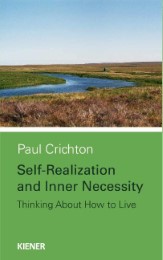Detailansicht
Self-Realization and Inner Necessity
Thinking About How to Live
ISBN/EAN: 9783943324969
Umbreit-Nr.: 5690757
Sprache:
Englisch
Umfang: 336 S., 15 Illustr.
Format in cm: 2.8 x 21.5 x 13.6
Einband:
Paperback
Erschienen am 20.09.2013
Auflage: 1/2013
- Zusatztext
- "How should we live?" is the crucial question Socrates asks at the beginning of one of the first books of philosophy, Plato's Republic. This very important and practical, but also challenging and wide-ranging question preoccupied the ancient Greek and Roman philosophers, and is especially pressing for us today, as some traditional sources of authority have lost credibility and more possibilities have opened up to many of us than in the past. The key aspects of how we should live which this book will focus on are self-realization and inner necessity. The book develops novel ways of looking at both of these topics after considering what some of the greatest thinkers of the last 2000 years or so have had to say about them, ideas which are both relevant and fascinating for us today. Self-realization is often rightly seen as emancipatory and for this reason it is an ideal which appeals to most of us. Inner necessity is about discovering our deepest impulses and following them. This book is written for people who are interested in philosophy but have no training in the subject. It avoids philosophical jargon and uses a lot of examples to make the issues clearer. These examples are taken from very varied sources, which include novels, poetry, opera, popular music, newspapers, films, painting, history, politics, psychiatry and psychology, reflecting the wide-ranging educational background, experience and interests of the author.
- Kurztext
- "How should we live?" Socrates already posed this existential question. Two important aspects are dealt with in this Book: selfrealization and inner necessity. Selfrealization is emancipatory and the inner need is to discover and follow our deepest impulses.
- Autorenportrait
- Paul Crichton MA (Oxon), MD (Munich), FRCPsych, PhD (London). Dr. Crichton is a Consultant Psychiatrist working for the Ministry of Justice in London. - His first degree was in Classical Studies (Latin, Greek, Ancient History and Philosophy) at Oxford University. - is medical training was at the Ludwigs-Maximilians-Universität in Munich. He worked for two years in neurology, at the Klinikum Großhadern in Munich and the National Hospital for Neurology and Neurosurgery, Queen Square, London, before doing his psychiatric training, first at Charing Cross Hospital and then at the Maudsley Hospital in London. He worked as a Consultant Psychiatrist in General Adult Psychiatry at Guys Hospital in London and then as Head of the Department of Psychological Medicine at the Royal Marsden Hospital, doing liaison psychiatry and cognitive behavioural therapy with people with cancer. He now sits on Mental Health Review Tribunals in London for the Ministry of Justice. - In 2003 he completed a BA and then in 2010 a PhD in philosophy at Birkbeck College, University of London. His PhD was entitled "Self-Realization An Exploration" and his supervisors were Prof. Miranda Fricker and Prof. Susan James. - His main interests lie in the borderline areas between psychiatry, psychology and philosophy, including, for example, psychotic phenomena, rationality and cognitive distortions, the mind-body problem, autonomy, social justice and political freedom, the social identity of individuals, ethical and non-ethical values, and self-realization. The thinkers who have most inspired him include Aristotle, Plato, Hume, Kant, Hegel, Wittgenstein, Rawls, Freud, Kahneman, Williams, Taylor, Nussbaum and Frankfurt
